My oh my, what an interesting week, and I don't mean that in a good way. From our trade deficit to our automakers on the brink of joining our domestic consumer electronics firms, things aren't looking all that swell. The latest indicators are showing, at least for November, what has been on everyone's mind, the economy. Some are saying, though that things will pick up, that the recession began a year ago and we'll come through it by 2009. We'll see, when the average worker is able to stop worrying not just about making rent or that mortgage payment, but also putting food on the table, then I'll agree. Globally, like the United States, things for now look dim. And like I said, the figures show it...which leads us to the Numbers!
The Numbers
Echoing the gloomy sentiment, today we saw the forcasts for December in the Empire State Survey. For the uninitiated, the Empire State Survey is a study of New York manufacturers and is put out by the Federal Reserve of New York. The survey's main indicator, the General Business Condition Index fell to - 25.8, which was an improvement over the consensus figure of - 27. Anything below zero indicates a negative outlook on the foreseeable month in question.
Also included (though graph not shown) is the outlook in prices paid, with the oscillator falling to - 7.5, as executives see costs coming down, this goes congruently with the outlook on prices received (what they would get for their product), which fell 18 points to - 11.7. Bottom line, manufacturers see their costs coming down somewhat, but they also see that they will also be getting less for their product, and that the rate of decline for the latter could be greater. Hence, the pessimism one sees in the General Business Conditions Index.

(chart courtesy of the Federal Reserve Bank of New York)
Adding to the no surprise catogory, Industrial Production also decreased. A good deal of influence to the downside came from the current situation with automakers. The latest figures are a reversal from the mini-recovery Industrial Production took in the previous recorded month of October. For November, we saw a decrease of - .6%, over the 1.3% increase from the previous month. Though, things could have been worse, as the consensus had a figure as low s -2.0%.
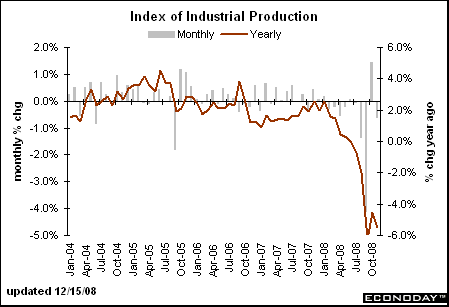
Manufacturing was dragged down by struggling carmakers, who posted production declines of 2.8 per cent in November from the previous month and 21.4 per cent from the same month a year ago.
Output of manufacturing industries in the last year is down by 7.3 per cent overall and 6.3 per cent excluding motor vehicles. Overall, industrial output fell 5.5 per cent from a year earlier. According to JP Morgan, industrial production is on pace to decline by an annual rate of 9.8 per cent during the fourt quarter of 2008, the largest quarterly decline since 1980.
- excerpt from "US industrial production slips further", Financial Times, 2008.
Import and Export Prices continued in their path in the realm of negative land (no not the band! Though I do miss them!). While a drop in demand, both by the retail consumer and the commercial purchaser did help bring prices down, a significant element in the depreciation of import prices came in price of petroleum. For another month, the price of oil has skidded downwards, as economic malaise alongside seasonal buying patters have added to a general drop in demand for petroleum and petroleum-based products.
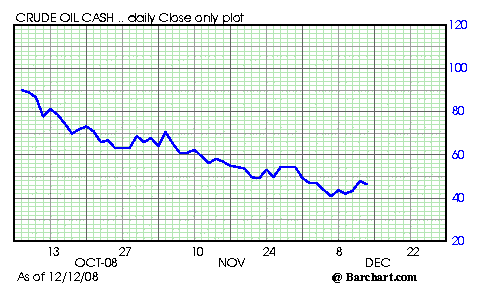
(A chart of the spot price for West Texas Intermediate oil, please note the $20 or 40% drop)
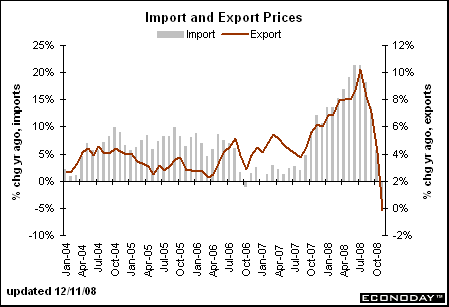
November's latest for Imports showed a - 6.7% drop in prices. This way below the - 4.7% of the previous month, and below the expected consensus figure of the same amount. As you will see below, this also has an added effect of lowering the costs to manufacturers in the form of a lower Producer Price Index. Of course, for those still making stuff here, this drop is almost bittersweet, as manufacturers know that the bigger force at play here is a drop in demand. Yes, costs have come down, but as a friend of mine who owns and operates a small manufacturing company in Skokie told me "yeah, my costs have come down, but so have my sales even more!"
Speaking of which, the other side of this, Export Prices have come down as well. One of our country's biggest exports has been natural resources ranging from coal to corn. While recently running up in prices, for the period in question, things have come down considerably. Below is a chart of the CRB Index, a benchmark on commodities as a whole.
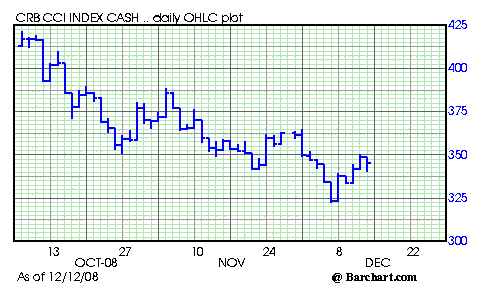
And below is a chart of one of our staple agricultural exports, soybeans. As you can see, like other commodities, these too have gone down.
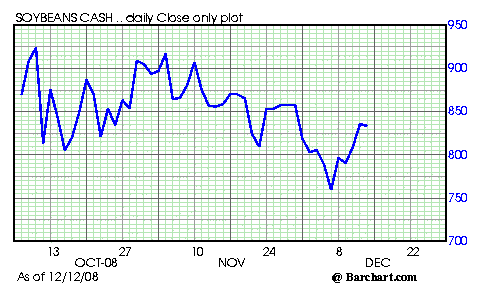
So it will not come to anyone's surprise that the price of our exports have come down as well. For the month of November, Export prices decreased by 3.2%, the biggest one-month drop since 1988.
The 7.4 percent decrease over the past four months was the largest four-month decline since the index was first published in September 1983. As a result of the recent downward trend, export prices fell 0.2 percent over the past 12 months. The price index for agricultural exports fell 7.0 percent in November and 23.0 percent over the past four months, the largest four-month drop since the index was first published in March 1985. The November drop was led by falling prices for meat, corn, soybeans, and wheat. Agricultural prices, which had risen 39.7 percent from July 2007 to July 2008, fell 2.8 percent for the year ended in November.
- excerpt from " U.S. Import and Export Price Indexes", Bureau of Labor Statistics, 2008.
Producer Price Index, as previewed above, the prices of what manufacturers and such, no matter where in the chain have been coming down for the month of November. Crude goods, that is raw stuff than need to be processed, prices fell 12.2%. Intermediate goods, such as components or materials that go into other products, fell 4.3%. Finished goods fell 2.2% overall.

Now before I continue, I need to give out a shout out and a mea culpa to New Deal Democrat. At Economic Populist, another blog site, he and I had a disagreement over core PPI, which is PPI minus food and energy. I told him that the whole situation seemed more like stagflation versus outright deflation. NDD said too keep an eye out how core PPI was a lagger and would "catch up" and fall alongside PPI. Alas, New Deal Democrat was right and I was wrong. My friend, I bow to thee, and admit I was wrong.
So we have dropping prices in imports. Dropping prices for commercial purchase. And dropping prices in our exports. This now leads us to an even bigger question, what about our trade deficit? Well...there's good news and bad news on that front. First the bad news, which should be filed under "obvious," we still have a trade deficit. The good news, well I lied, there is no good news.

The Balance of Trade numbers are a two months behind, one of those lagging indicators, with the latest reporting for October. Of which, we saw a surprising drop into $ - 57.2 Billion, not good compared that in the previous reported month the Balance of Trade hit $ - 56.5 Billion. Given how crappy things had gotten in October, folks were figuring that the deficit would shrink. The consensus for October was $ - 53.5 Billion. Experts are citing that the rate in the drop of exports was greater than that of imports, thus leading to the surprising number.
"As world growth slows dramatically, and many of America's largest trading partners slide into recession, export markets are looking significantly more challenging for US firms," said Meny Grauman of CIBC World Markets.The problem was compounded by a relatively stronger US dollar since June, Grauman said.
"The global slowdown is also curbing investment in plant and equipment," noted Christopher Cornell, an economist at Moody's Economy.com.
Exports of industrial supplies and materials and imports of capital goods both fell in October, leading declines of their respective categories, he said.
"Investment is strongly procyclical, and these constitute another indicator of a global recession," he said.
- excerpt from "US trade deficit grows", AFP, 2008.
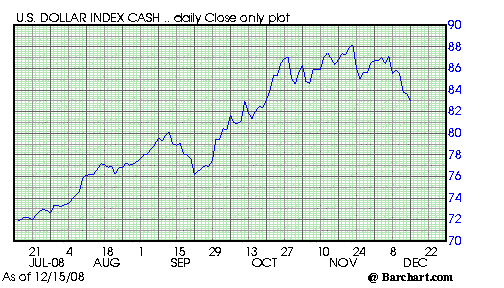
Indeed, as the chart above shows, the US Dollar, until recently has been on a tear. Above is a chart of the US Dollar Index spot price, which represents the value of the Greenback against a basket of currencies. To best understand this index, when it was first initiated in 1973, it was at 100. It has had several major peaks, the two most recent was in the 163 in the 1980s, and about 120-122 in 2000. The lowest it has ever gotten was 73 back in 2008. Ironically, the last major low of the USDX was in 1992 during the First Bush Administration.
A weaker US Dollar should boost exports. Unfortunately, our trading partners aren't exactly in good shape either. By the time the financial crisis blows over, we may not be manufacturing things, well, perhaps at the least producing like we have been (let alone how we used to!). The currency is prone to drop, which while keeping mind what I just said about exports, will also make imports (like oil) more relatively expensive.
This is why folks like Bondad and Jerome a Paris are correct when they say oil could still go up(well actually, they've stated other damn good reasons, I'm the one taking the collapsing Dollar angle here). Unless oil is priced in a different currency, despite a drop in demand, there will always be demand for petroleum. And should the US Dollar return to the downside, the price of energy will rise. So the question begs, which would be greater? The drop in demand or the drop in the value of the US Dollar?
Foreign Governments to their auto companies: :)
A week or so ago, I was watching the Bloomberg channel, it was late at night. In the evening, Bloomberg cuts away from it's US broadcast to whatever foreign market is open, it then relays that version on their broadcast. Well I saw something on the channel's Asian broadcast that sorta blew me away. I say sorta, because half of me really wasn't surprised. While we here were discussing on how GM will die, it appears the opposite is happening overseas. On my screen, there was someone who was part of some sort of think tank or investment group from Korea. Now I can't think of the exact quote, but basically the man said (paraphrasing here) "Korea expects a downturn in the economy, and the government is taking steps to insure when things pick up we have an export market." He said some other things, but that's what got to me. Hot damn, see this is why this very well could become the "Pacific Century"! Looking on the net, I came across several gems that basically told me that these countries were looking down the road (no pun intended).
BEIJING – China is rolling out new measures to reverse a worsening economic slump with interest-free loans to companies and possible steps to boost plunging auto sales and aid steelmakers, the industry minister said Friday.
"Industrial growth is sharply declining and we have not seen a turning point yet. We feel a lot of pressure," Li Yizhong said at a news conference.
The government will spend 15 billion yuan ($2.2 billion) to subsidize loans to companies to improve technology and cut energy use, Li said. He said Beijing might buy surplus steel to help producers as demand plummets and cut taxes to spur auto and real estate sales.
- excerpt from "China to give companies aid to cope with crisis", AP, 2008.
And it isn't just in Asia, the idea of making sure there is a domestic auto industry is also playing out in Europe. For both groups, this isn't one of those ideological battles, something to use as a tool for partisanship hoping to destroy a rival party. While we argue "well this doesn't seem free-market enough", this is like us thinking only one or two moves down while our competitors are thinking five or ten! It seems there is no foreign version of Senators Corker or Shelby, and if they are, they thing longer term. Oh...and keep in mind, they aren't just playing long term with autos, they are playing long term on everything!
In the European Union, carmakers have called for support worth €40 billion, or about $53 billion. Although they may not get that much, governments are planning a broad range of measures. Much of that support, as elsewhere, is meant to accelerate the development of "green" vehicles.
The European Investment Bank will provide the industry with €4 billion in low-interest loans in both 2009 and 2010 as part of the European Clean Urban Transport initiative. The European Commission, the EU's executive arm, will spend €5 billion over two years for the same ends.
National governments, including those of France, Germany, Portugal, Spain and Romania, have plans to provide hundreds of millions of euros more in research and development, tax breaks and loans. Sweden on Thursday announced support valued at more than $3 billion for its auto sector.
- excerpt from "Auto industry aid pleas are rising globally", International Herald Tribune, 2008.
Dec. 11, 2008 -- The Swedish government on Dec. 11 announced a 28-billion-kronor (US$ 3.5 billion) package to help the country's beleaguered automotive sector, including carmakers Volvo and Saab. The measures "will take the form of increased investment in research and development and state credit guarantees for raising loans (from) the European Investment Bank," the government said.
- excerpt from "Swedish Auto Industry Gets $3.5 Billion Aid Package", IndustryWeek, 2008.
When I watched those Senate hearings, one of the best things I heard actually came from a Republican I don't care too much for, Sen. Robert "Bob" Bennett. At one point during the testimonies of the auto folks and economic experts, he said that the one thing this country hasn't done in a long time was to have an industrial policy. You know what? He's right! This country has a Department of Commerce that's supposed to insure markets are open to our products and to promote American industry. So far, though what we've seen is that Dept. of Commerce is a half-ass job where the only thing that has been opened was access to our markets. So in reality, looking back the past quarter of a century, the Department of Commerce as acted as nothing more than an agent for foreign business interests and economic traitors.
But like I said, our competitors are playing a longer-term game, while we play petty politics. The Democrats, and I'm assuming for the sake of argument that they are looking out for American manufacturing, should be doing more. I want you to look beyond GM's bad management, that's a given! Don't like it, remove them, but my stars, let's keep this industry! Yet no, we get held up over ideology and politics. That the fact that the Republican version of Bevis and Butthead have managed to get away with what they have speaks volumes of the Democratic Senate leadership.
Indeed, industrial policy (aka regulation) should have been made a long time ago. When those first imports came from Japan and took off during the energy crisis, we should have gotten together. We have such an aversion in this country about the State taking partial ownership in a private entity, it borders on the some sort of psychological pathology. Many conservatives, and especially those libertarians, have this crazy ass notion that if the government owns shares in a company, even a minority stake, that by tomorrow morning an American KGB will come and get them. Don't tell me I'm wrong, I was once a conservative and have sat through countless discussions that echoed similar memes!
Here are competitors are playing chess, and we are playing...I won't even say checkers, because we aren't...more like Candy Land!
Toyota to future southern employees: what pay raise?
Here's something that may make Senator Shelby happy, it seems that Toyota is gonna put the screws on it's employees. The plutocratic plantation doyen wannabe has been espousing how basically if us northerners and westerners would be like them and eject the union, things would be kosher. For Master Shelby and others, you do a good job and keep competitive (i.e. stay cheap and do more), you'll be rewarded down the road with bennies that the company may deem fit. Well, if the Detroit Free Press is correct, staying competitive won't mean jack! The paper got a hold to an internal memo that will make that Alabamian Hamburglar look like an even bigger douche.
The report from Seiichi (Sean) Sudo, president of Toyota Engineering & Manufacturing in North America, said Toyota should strive to align hourly wages more closely with prevailing manufacturing pay in the state where each plant is located, "and not tie ourselves so closely to the U.S. auto industry, or other competitors."Sudo's report to top managers said the Japan-based company projected a $900-million increase in U.S. manufacturing compensation by 2011, and human resources officials were working on trimming that by one-third.
The drive to hold down costs may boost UAW organizing efforts, if Toyota workers balk at the possibility of smaller raises, reduced benefits or greater demands for productivity gains. But the plan also illustrates that the world's most-profitable automaker is going to keep relentless pressure on Detroit and its signature industry.
- excerpt from "Toyota sweats U.S. labor costs", Detroit Free Press, 2008.
Basically, Toyota's plants in the US, have workers earning more than their compatriot in other plants in those states. In states like Alabama and Kentucky, workers at Toyota's operations earn more than those who work for rival foreign transplants. Management wants the wages and such to come to parity with the employees of those other plants.
Now see, this is why unions are needed. The mass of workers at these Toyota plants do not have real collective bargaining powers. For management, it's divide and conquer. Now workers on those Toyota plants could walk out, but they won't have any real leverage. There is no real established body representing what the employee's side. And in this economic climate, it would not be hard for these plants to find new workers. On top of that, any action taken by large groups like a sit-in as we saw with workers at the now-defunct Republic Windows, would be met with resistance by not only the company but the government. Keep in mind, states like Alabama or Kentucky are not exactly organized labor friendly. If they are seen as being "friendly" with these workers, this could put their future projects with other transplants in jeopardy. As many have said, the South has become some sort of international corporate colony.
Make no mistake, people like Corker are like the old Raj of Colonial India. The modern South is, for all intents and purposes, a Colonial region.
In the post-Civil War days of the New South the South essentially became a colony of Northern industrialists. Atlanta Constitution editor Henry Grady welcomed Northern industrial investment. The city of Birmingham became the Pittsburgh of the South. But the selling point was cheap labor.- excerpt from "Auto Bailout Talks Collapse Hotlist", Elrod, DailyKos, 2008.
It should be noted, that Toyota, unlike the entirety of the Detroit 3, is still a profitable company. They have even corned the "green market" at the moment with their hybrid, the Prius. But the economy has hit a downturn and it looks like they may report a loss for the quarter. The fundamentals, though in relative comparison to say Ford or GM, are significantly better. Toyota is now where GM was, as the largest corporation in the auto industry.
"The companies in Detroit are going to say, 'Look, we're in dire straits here. We're going to have to follow what they do,' " said Kenny Harper, 48, who has 18 years' seniority at Toyota's flagship complex in Georgetown, Ky.
Harper, who wants the UAW to represent Toyota workers, said he disagrees with the company on principle.
"Now I can understand if the company is having a hard time," said Harper, who has been off work for 12 weeks while healing from shoulder surgery after an on-the-job injury. "I'm more than willing to work with that company to keep my job. But when they just take it because they want more, I don't agree with it at all."
- excerpt from "Toyota sweats U.S. labor costs", Detroit Free Press, 2008.
Sony to close up last US TV factory!
IndustryWeek is reporting that Sony is shutting down it's 18-year old Pittsburgh plant. The factory, which employed 560 people, which was one of two North American plants producing LCD HD TVs will close down at the end of February of 2009. Now I have mixed feelings about Sony at the moment. For starters, they do have other manufacturing facilities, like the Blu-ray DVD plant in Indiana which already employs over a thousand people. But I'm still sadden to see it close down it's last television manufacturing operations in the US.
To be honest, I wasn't even aware we even made televisions anymore! I've gone to Best Buy and out of curiosity asked and have either gotten a no or they laughed at me. And deep down, I feel a bit crappy over the fact that we don't make any consumer electronics in this country! For crying out loud, we practically invented the television (well actually the first "mechanical" one was invented by a Scotsman by the name of John Logie Baird, utilizing a spinning disk invented by Paul Nipkow and an electronic one by American scientist, Philo Farnsworth)! Ack...getting off on a tangent here! Sorry.
The repair and logistics facilities located in Westmoreland, Pennsylvania will also close, though almost a year later. Of course, for Sony's television manufacturing operations, it hasn't given up totally on North America. It still will have a manufacturing complex in the continent, one that could no doubt see expansion.
Sony said its remaining North American television manufacturing centers in Baja, Mexico, "will be able to handle anticipated market demand in the region for the foreseeable future."
- excerpt from "Sony to Close LCD TV Plant in Pennsylvania", IndustryWeek, 2008.
Wow...a Win for US in the WTO!
Well, here's something you don't often hear about every day. The US won a case in the World Trade Organization against China. It seems that Beijing didn't like the original ruling that is had it's tariffs too high and other import restrictions and didn't comply with WTO regulations. Besides the US, the complaint was joined by the European Union and Canada. China appealed, and today was ruled once more by the governing body that it must adhere to the original ruling and lessen the restrictions.
"Especially in light of the current problems faced by the U.S. auto industry, I expect China to comply promptly with its WTO obligations by removing an unlawful and unfair trade barrier that is harming U.S. workers and manufacturers," said U.S. Trade Representative Susan Schwab.
Her European counterpart, EU Trade Commissioner Catherine Ashton, said "China should now put an end to the discrimination and ensure a level playing field in its automotive sector."
- excerpt from "WTO Rejects Appeal by China Again" WSJ, 2008.
Under China's rules, automobiles have a two-tier tax system, a significantly higher one for foreign-made automobiles, and a high one for foreign vehicles which contain a minimum portion of Chinese-made parts. Unless the automobile has at least 40% of the parts made in China, the product in question will be regarded as totally-foreign made automobile.
Beijing has a minimum local content requirement of 60 percent for home produced cars. A vehicle that fails that criterion suffers the same tariff as if it had been imported completely built.
China imposes an import duty of 25 percent on whole vehicles and only 10 percent on auto parts.
China has said the rules aim to prevent tax evasion by companies that import whole cars as spare parts to avoid higher tariff rates.
But the US argued that the measure puts pressure on foreign auto parts producers to re-locate their manufacturing facilities to China and discourages car makers in China from using foreign auto parts in the assembly of vehicles.
- excerpt from "China loses appeal against WTO car parts ruling" AFP, 2008.
Allow me to say about damn time! We should have been on their asses long before the situation with the autos! Now I'm not exactly a fan of the World Trade Organization, but I am happy with them ruling in our favor. I've said it before and I'll say it again, this country needs an industrial policy! We got one on China today, but what about Korea or Japan? But this victory, not to look a gift horse in the mouth, is miniscule, because at the end of the day that market is biased against foreign-made goods.
Yes, they allow KFC, but then again they are using Chinese chickens, so where's the big deal in that? No, they have an inherint nationalist bias against anything foreign-made. Oh they may buy a thing or two here, I've seen our export stats. Keep in mind, it isn't a biased against American products, the Europeans have also been complaining for a while that their stuff gets taxed into consumer oblivion as well. Adding insult to injury, piracy is ramped there! How many times am I going to read a story where a company, acting as a domestic business partner with a foreign outfit to help bring one product line, was actually producing on
the side another of their foreign partner's products illegally?
So far free trade, at least for the folks in this country, hasn't really been all that gratis. I just wonder, what those Kudlowites had in mind when they said free trade would bring in "cheaper" products.
------------
Cross posted from Venomopolis.


Comments
industrial policy
or anything in the national economic interest as well.
As far as I know the U.S. is the only major nation which doesn't have as part of it's government a manufacturing, industrial policy.
I do believe various Congressional members have introduced bills which have been immediately ignored and sent to committee to die.
I think we need to start pushing for policy objectives and bills here, try to get some public demand and interest.
Industrial policy and peak automobile
Robert, if my memory serves, the last time there was any kind of real attempt to talk about industrial policy in this country was in the early 1980s, particularly by Robert Reich. As the 1980s wore on, it simply disappeared from anyone's agenda.
There is an industrial policy in this country, as it may have been asserted on this site, and that is the defense department's purchasing power. But as my friend the late Professor Seymour Melman spent a career arguing, the "bad habits" learned in defense industries and the diversion of much of the engineering "best and brightest" into learning those bad habits has taken a very real toll on our manufacturing competence. So in a way, defense department spending is almost "anti-industrial policy", it's making things worse.
The flailing around about what to do with the car companies will revive discussion of the idea, if not the phrase "industrial policy". What probably should be discussed is a policy to move transportation equipment manufacturing from being centered on cars to being centered on trains; but I'm afraid that's way too far ahead of the curve (or off in left field) at this point.
Which brings me to a question: is it possible that we've hit "Peak Automobiles", that is, the world will never make as many automobiles as it did in the last year? I know that sounds unlikely with China and India growing; maybe it will be "peak automobile outside of China and India". I remember reading that the rate of sales in the US now is equivalent to 10 million sales a year, when the capacity right now in the US is for 17 million per year.
If automobile production is peaking, then the Europeans and Asians will have to readjust their industrial policies from getting their car companies "over the hump" to actually redirecting them into train manufacturing, and at the same time come up with long range plans for rail-building. or this all might not be clear until we get a whip-saw from oil, that is, as economies recover, oil prices skyrocket, then plummet as economies go into reverse from rising oil prices.
Anyway, thanks for the post, as always, very informative!
JR on Grist
Jon Rynn
you bring up a qood question
about peak autos. The economy, as it is, is saying for the time being that yes we've hit such a peak. Folks are finding it hard to spend on things, obviously, so going back to 17 million cars sales is a long way off. On top of that, and I'm going to need someone to back me on this, that in terms of population growth we are peaking. It is said that, perhaps long term, we could reach 9 billion. But that bumper crop known as the Baby Boomers was "it" in terms of pop explosions. I'm not sure about that, but we must realize that the pool of potential customers is shrinking one way or another perminantly. At least, with the given price structure for autos. The developing world cannot afford a $30k automobile, and those here as well are starting to shy away from that. So if there is to be a future for automobiles, it will have to be a cost-effective model.
Peak cars - I don't think so.
First, we buy and throw away for an economy. Second, new (and cheap?) cars with updated technology will be like the Iphone or Ipod Touch - gotta have one.
This article surprised me. But if Chrysler really goes after the low end, they might, just might make it - if this country doesn't let them die.
link
They're asking for another four years -- in a just world, they'd get 10 to 20 ~~ Dennis Kucinich